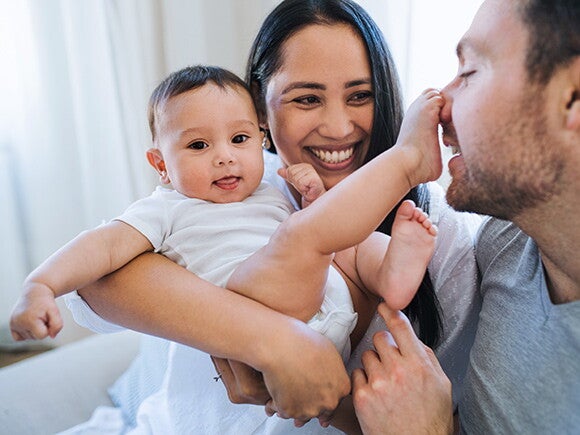
What is shared parenting?
Shared parenting is the purposeful practice of two parents sharing evenly in the responsibilities of raising their children. This parenting style may include sharing domestic tasks, bearing the mental load together, earning money, and having time for themselves.
The practice of sharing parenting duties is becoming more common in many countries around the world. This is demonstrated with 62% of parents surveyed globally believing that dads are more active and engaged in childcare than previous generations.
Of course, it’s not only mums and dads who are sharing the parenting responsibilities. Changing family structures may also be contributing to an increase in sharing caregiver responsibilities, with more children growing up in a blended family or multi-generational family homes than before, as well as more same-sex parents raising children.
What are the benefits of shared parenting time?
If you are in a partnership, one of the biggest benefits of sharing parenting time has to be that you both get the same amount of special bonding moments with your children, watching them grow and develop every day. You also get equal opportunity to pursue your careers, with no one partner feeling like they carry the burden of having to provide financially for the family. In Chile for example, where more than half (52%) of mums and dads report sharing more equal parenting responsibilities and domestic tasks, the number of working mums is on the increase.
Shared parenting can also be great for your relationship. You may feel empowered by what you can achieve in your ‘dream team’ and less overwhelmed and lonely as a result. We found, in Spain, where 64% of parents agree that childcare responsibilities are equally shared in their household, only 20% say they felt lonely in the first months after birth—this is one of the lowest figures globally.
Why aren’t parenting responsibilities shared everywhere around the world?
With so many benefits of shared parenting time, why isn’t everyone sharing the load? This may come down to a combination of practical reasons as well as cultural norms. For example, in Mexico, where shared parenting isn’t common, dads are only entitled to five days of paternity leave, which may be limiting their ability to get more involved.
This contrasts with Germany, where although dads have access to a broader parental leave allowance, only half choose to take it and this is typically only for two months, compared with mums who tend to take 12 months.
In Romania, cultural traditions mean that dads are more likely to work and earn money for the family, whereas mum’s role is to stay at home and look after the children. This is reflected by respondents not seeing an improvement in how parenting is split compared with previous generations, and half even thinking their partner is less involved!
It may also come down to perception— global analysis of 16 countries reveals that half (47%) of dads claim parenting is shared equally in their home, whereas only 30% of mums agree.
What’s next for shared parenting?
Despite more families sharing the parenting load, less than half (49%) of parents globally report that childcare responsibilities are equally split. There is also a consensus that mums bear the brunt of the parenting challenges—meaning there is still room for improvement.
Feeling like there are some imbalances in your parenting partnership? Read how to master equally shared parenting and get first-time parent tips.
If you’ve separated from your partner or you’re bringing up your child outside of a traditional parenting arrangement, check out our guide on how to successfully manage co-parenting.
Shared parenting should start at the conception stage as well. For advice on what men should eat for healthy male fertility, read our guide How to Improve The Male Fertility Of A Dad-To-Be.
Sources
The Parenting Index, First Edition 2021, theparentingindex.com
Last revised: June 2022





